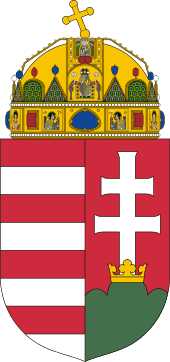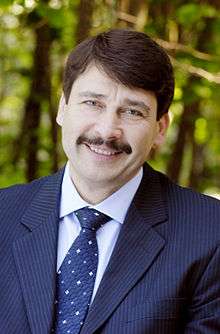Leader of the Opposition (Hungary)
| Leader of the Opposition | |
|---|---|
| Term length | While leader of the largest political party not in government |
 |
| This article is part of a series on the politics and government of Hungary |
| Foreign relations |
The Opposition (Hungarian: Ellenzék) in Hungary is the body of political parties represented in the parliament which are not a part of the government supported by the parliamentary majority.
The Leader of the Opposition (Hungarian: Az ellenzék vezére) is the unofficial title held by the leader of the largest party of the opposition.
History
The Leader of the Opposition is normally the leader of the largest party not within the government, which is usually the second largest political party in the National Assembly.
Following the first democratic election in 1990 after the end of communism, Alliance of Free Democrats (SZDSZ) suffered a close defeat, thus becoming the leading opposition force in the parliament. After the fall of the conservative government at the following 1994 parliamentary election, SZDSZ, the second largest party, surprised many by entering into a coalition with the Hungarian Socialist Party (MSZP), which achieved a remarkable revival, winning an overall majority of 209 seats out of 386.[1] Thus Hungarian Democratic Forum (MDF), only with 38 MPs became the largest opposition party, while the government had a two-thirds majority.
On 4 March 1996, 15 MPs left MDF and formed Hungarian Democratic People's Party (MDNP), as a result agrarian right-wing Independent Smallholders, Agrarian Workers and Civic Party (FKGP) became the largest opposition party. By 1997, several parliamentarians had joined the Fidesz, mainly from the disintegrating Christian Democratic People's Party (KDNP). The Fidesz became the main challenger to the socialist-liberal cabinet.
From 1998 until 2010, there was a de facto two-party system in Hungary. MSZP suffered a heavy defeat in the 2010 election (won by Fidesz with a two-thirds majority), gaining only 19,3% of the votes, and 59 seats in the parliament, nevertheless the Socialists were able to maintain their leading role in the opposition, while Hungarian politics became a dominant-party system. The 2014 parliamentary election confirmed this position. Socialist Party Chairman József Tóbiás has been the Leader of the Opposition since 19 July 2014.
List of leaders of the Opposition
| # | Leader | Political Party | Term of office | |
|---|---|---|---|---|
| 1 | .jpg) |
János Kis | Alliance of Free Democrats | 1990–1991 |
| 2 |  |
Péter Tölgyessy | Alliance of Free Democrats | 1991–1992 |
| 3 |  |
Iván Pető | Alliance of Free Democrats | 1992–1994 |
| 4 |  |
Lajos Für | Hungarian Democratic Forum | 1994–1996 |
| 5 |  |
József Torgyán | Independent Smallholders, Agrarian Workers and Civic Party | 1996–1997 |
| 6 |  |
Viktor Orbán | Fidesz | 1997–1998 |
| 7 | .jpg) |
Gyula Horn | Hungarian Socialist Party | 1998 |
| 8 | |
László Kovács | Hungarian Socialist Party | 1998–2002 |
| 9 | |
Zoltán Pokorni | Fidesz | 2002 |
| 10 |  |
János Áder | Fidesz | 2002–2003 |
| (6) |  |
Viktor Orbán | Fidesz | 2003–2010 |
| 11 | Ildikó Lendvai | Hungarian Socialist Party | 2010 | |
| 12 | |
Attila Mesterházy | Hungarian Socialist Party | 2010–2014 |
| — | |
László Botka[2] | Hungarian Socialist Party | 2014 |
| 13 | |
József Tóbiás | Hungarian Socialist Party | 2014– Present |
References
- ↑ Bodan Todosijević The Hungarian Voter: Left–Right Dimension as a Clue to Policy Preferences in International Political Science Review (2004), Vol 25, No. 4, p. 421
- ↑ Acting Leader of the Opposition